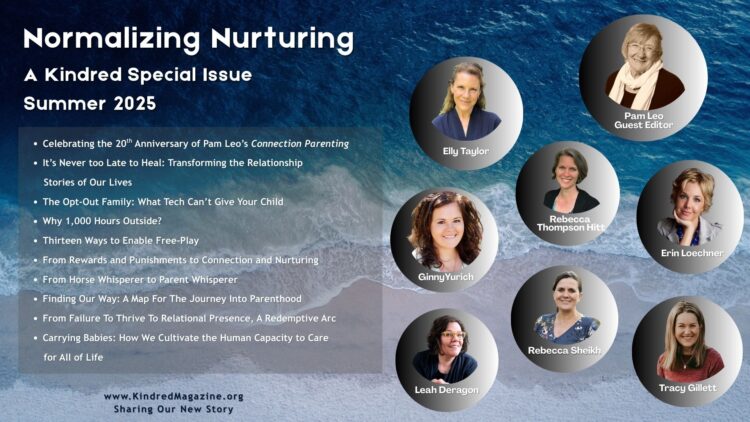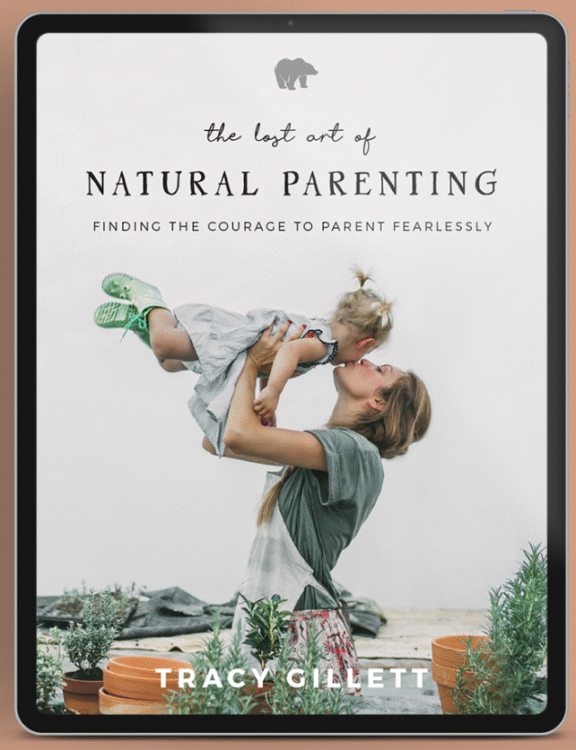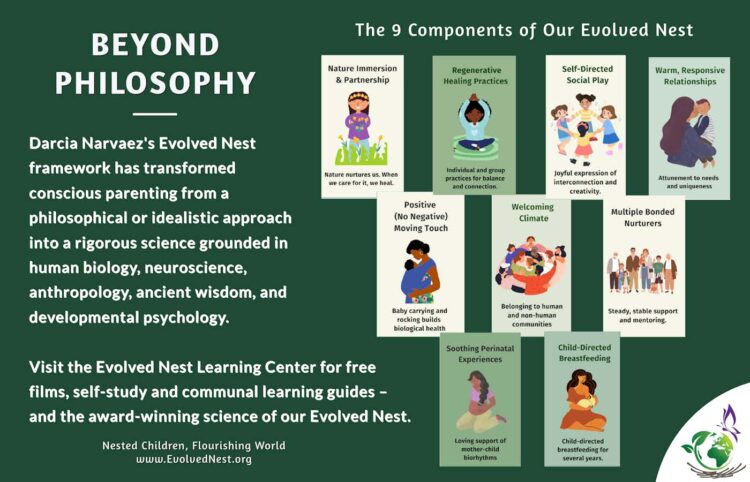The work of normalizing nurturing isn’t just about changing individual families, though that would be enough.
It’s about shifting our entire cultural understanding of what children need and what parents can trust.
When we choose the whisperer’s way over the breaker’s way, we model a different possibility for our communities.
We show that strength doesn’t come from dominance, but from deep connection.
We prove that meeting children’s needs doesn’t create weakness – it creates resilience.
– Tracy Gillette
“He’ll sleep with you,” said our dry-humoured English midwife.
“What do you mean?” I replied. “He’ll sleep in his expensive organic, non-toxic crib I just ordered.”
“No,” she said. “He’ll sleep with you – I can tell.”

I walked out of our prenatal visit thinking our midwife was a little odd. But she’d aroused my curiosity, so I started reading and I couldn’t stop. One author suggested that babies were safest sleeping with their parents. That babies could use the potty instead of diapers. And that we didn’t need a stroller – we’d form a stronger bond with our son by carrying him.
While unconventional, the concepts I uncovered felt natural, logical and authentic. But it wasn’t until years later, reflecting on a profound experience from my veterinary school days, that I truly understood what my midwife had seen in me that cold, misty Tuesday morning.
The Dance in the Round Yard
When I was in veterinary school, I was lucky enough to spend a few weeks working on a beautiful coastal farm in Australia. The owner was a real-life horse whisperer, and people from far and wide brought their “problem” horses to him to be rehabilitated.
Most of these horses were terrified, and their behavior reflected it. They’d rear onto their back legs, eyes wide with fear, snorting, kicking and trying in any way they could to fiercely defend their vulnerable personal space.
As I sat perched safely on the old wooden fence, I was mesmerized by this strong, burly Aussie bloke as he communicated peacefully, patiently and respectfully with these majestic animals. It never entered his mind that these were “bad” horses, and getting the “job” done quickly was clearly not a priority for him; it would simply take as long as it took.
They took their time: the journey was more important than the destination.
Witnessing a 1000-pound horse go from being visibly distressed to lying on the ground calm and relaxed, being gently stroked by this human who was so recently a threat, was nothing short of miraculous. What struck me most was his ability to see beyond the surface behavior – the rearing and kicking – to the frightened soul underneath. He understood that these horses weren’t giving him a hard time; they were having a hard time.
That understanding changed everything.
My North Star: Seeing Souls, Not Problems
Years later, as I held my newborn son for the first time, I realized what my midwife had recognized: I had the heart of a whisperer, not a breaker. My North Star – the principle that guides everything I do through Raised Good – is seeing children’s souls, not their behavior, and trusting that when we meet children where they are, magic happens.
This perspective fundamentally shifted how I approached parenthood. When my son would have what others called “tantrums,” I saw big feelings in a small body. When he needed to sleep close to us night after night, I saw a biological need for safety and connection, not manipulation or bad habits. When he clung to me during difficult transitions, I heard his soul’s communication: I need you to be my compass while mine recalibrates.
Once I learned to see his soul, a deeper question emerged – one that would become my compass through every challenging moment. When he was melting down, when others told me I was ‘spoiling’ him, when I doubted myself, I would return to one quiet question: does my parenting choice in this moment strengthen our connection or weaken it? And I’d always choose to strengthen connection.
Normalizing Nurturing in a Breaking Culture
 The work I do through Raised Good centers on normalizing nurturing and fostering connection in a culture that too often tries to break children’s spirits. Much like traditional horse trainers attempt to break horses into submission, I fear we may be unconsciously breaking our children with mainstream techniques that favor detachment over connection.
The work I do through Raised Good centers on normalizing nurturing and fostering connection in a culture that too often tries to break children’s spirits. Much like traditional horse trainers attempt to break horses into submission, I fear we may be unconsciously breaking our children with mainstream techniques that favor detachment over connection.
So, instead, we need to normalize responsive nighttime parenting in a culture obsessed with sleep training. When a mother tells me she feels like the odd one out for wanting to comfort her crying baby, I help her understand that she’s following millions of years of biological wisdom, not creating bad habits, and that although she can’t see them she has sisters in the night around the world doing the exact same thing, at the exact same moment.
We need to normalize seeing behavior as communication rather than manipulation. When parents are told their eight-week-old is “just trying to control them,” we provide the scientific truth: babies are born with only one power – to elicit tenderness and caring responses from their parents. Attachment is about survival, not scheming.
We need to normalize immaturity over expecting adult behavior from children. Toddlers are brilliant – they live in the present moment, they’re authentic and unfiltered, among the most honest humans on the planet. But perhaps they’re also the most misunderstood. We’ve forgotten what it’s like to be small, immature and dependent, to feel only one strong emotion at a time without the tools to regulate it, to experience the most rapid brain development of one’s life.
We now know that the brain doesn’t fully mature until our mid-late twenties. The prefrontal cortex – responsible for judgment, planning, and emotional regulation – is the last area of the brain to mature. Yet our culture expects young children to have self-control and rational thinking. We need to understand that our children are doing the best they can, with the brain development they have.
We need to normalize being the calm in their storm instead of escalating punishment or trying to squash behaviour. We need to teach our children that our relationship is bigger than any upset or problem. That we love them for who they are, not what they do. Just like the horse whisperer saw past the rearing and kicking to the frightened soul underneath, as parents we need to see past the behaviour to the overwhelmed little person who needs support, not punishment.
We need to normalize the long game of relationship-building over quick fixes. Like the horse whisperer who understood that rushing the process would only create more fear, as parents we can see that taking time to build trust and connection isn’t permissive – it’s powerful and profound.
We need to normalize trusting parental instincts over cultural expectations. My midwife saw something in me that I couldn’t yet see in myself: the wisdom to follow my child’s cues rather than society’s scripts. To parent against the grain of mainstream culture, so that I could follow my child’s flow. Now I help other parents hear their own inner voice above the cultural noise and find the courage to trust it.
The Whisperer’s Way: Connection Over Control

When we choose nurturing over breaking, something magical happens. But first, we must understand what we’re truly building: connection.
Connection describes the strength of the relationship we have with our children. Connection helps our children feel seen and heard, safe and secure. From birth, their instincts drive behaviors that seek it out. Children know subconsciously that their survival depends on being attached to us, and they will do just about anything to protect or restore that connection.
This is precisely why traditional discipline techniques can seem to “work” in the short term – because they leverage connection as a weapon. They communicate that our love as parents is conditional on our child’s behavior pleasing us. Children learn to perceive that we love them when they’re good but not when they’re bad. They comply not because they’re learning, but because they’re scared – scared of losing the connection they desperately need.
Connection is the antidote to coercion. Just as the horse whisperer understood that fear-based methods might achieve temporary compliance but would never create genuine cooperation, as parents we need to see that connection, not control, is always the answer. It dwarfs coercive methods in its ability to shape children’s behavior. Connection is a natural parent’s superpower – it’s the only reason kids will freely give up what they want to do and do what we want instead.
In my own family, seeing parenthood as a relationship rather than a set of strategies allowed us to effortlessly sidestep traditional discipline techniques like timeouts, threats and rewards. They’re tools that simply don’t exist in my parenting toolbox. Prioritising connection has created a depth of relationship with my child that I have never experienced in my own life. It has helped me heal my own inner child wounds. And it has changed how I approach other relationships in my life, for the better.
This is the ripple effect of normalizing nurturing: when we refuse to push our babies away, they learn they don’t need to cling to us, because they know they can rely on us always being there. When we meet their dependency needs fully, they come to develop secure independence, in their own time.
Every day, I witness the same miraculous transformation I saw in that round yard decades ago. Parents who were told their children were “too clingy” or “manipulative” learn to see emotional vulnerability, and immature children doing the best they can. Families who felt broken by mainstream parenting advice discover they were never broken at all – they were just trying to force square pegs into round holes.
From Midwife’s Prediction to Global Movement
My midwife was right, of course. My son did sleep with us – for years. But more than that, she saw the whisperer in me before I could see it myself. Now, through Raised Good’s community of over a million parents, I get to be that voice for others – helping them see their children’s souls when the world insists they see problems.
Every day, I witness the same miraculous transformation I saw in that round yard decades ago. Parents who were told their children were “too clingy” or “manipulative” learn to see emotional vulnerability, and immature children doing the best they can. Families who felt broken by mainstream parenting advice discover they were never broken at all – they were just trying to force square pegs into round holes.
The work of normalizing nurturing isn’t just about changing individual families, though that would be enough. It’s about shifting our entire cultural understanding of what children need and what parents can trust.
When we choose the whisperer’s way over the breaker’s way, we model a different possibility for our communities. We show that strength doesn’t come from dominance, but from deep connection. We prove that meeting children’s needs doesn’t create weakness – it creates resilience.
Like the horses who learned to trust again, our children learn that the world can be a safe place when they have adults who truly see them, accept them for who they are not what they do and give them the experience of unconditional love. And in seeing our children clearly, we heal the parts of ourselves that were once unseen. That’s the real magic of normalizing nurturing: it doesn’t just change our children’s lives. It changes everything.


